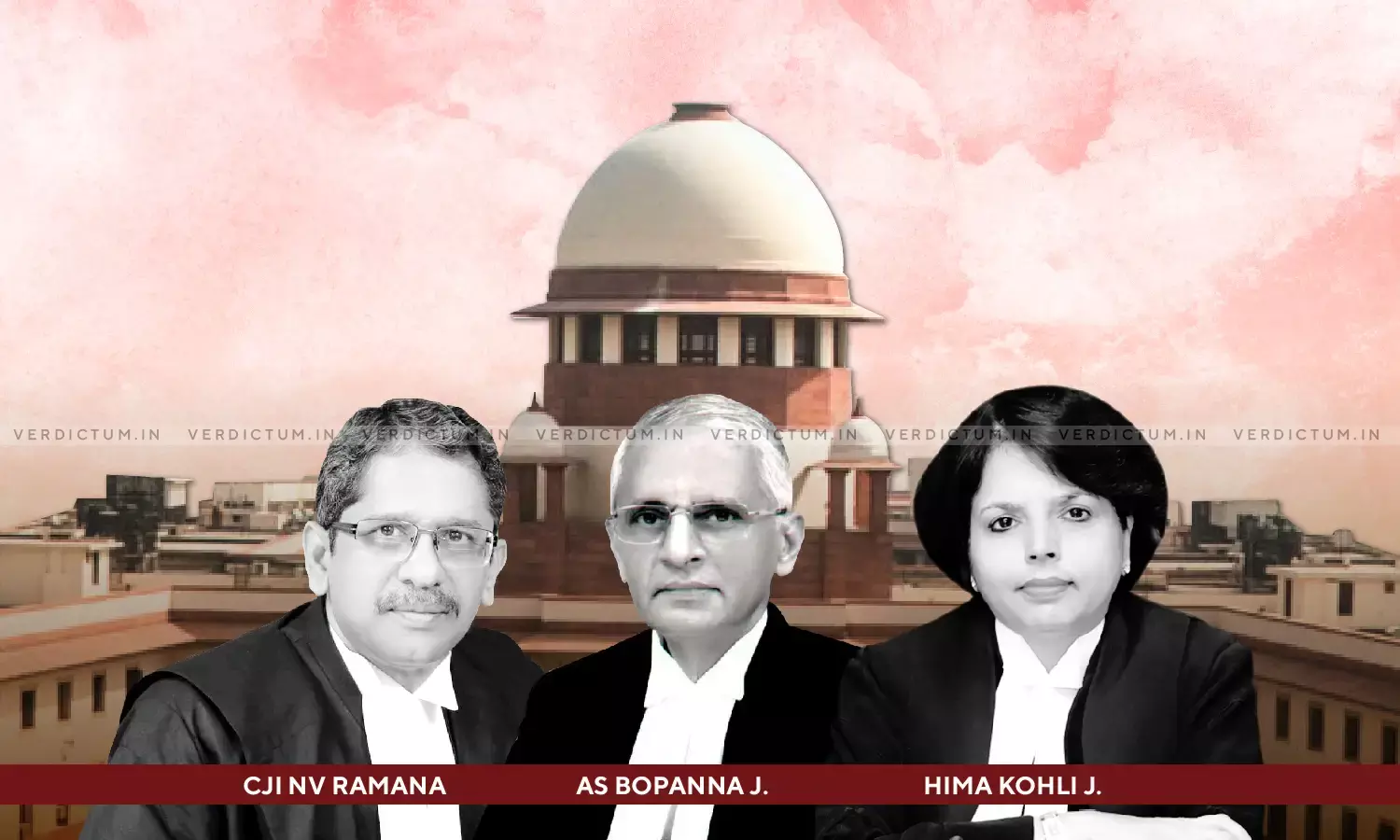A three-judge Bench of CJI NV Ramana, Justice AS Bopanna & Justice Hima Kohli has held that the dying declaration of the wife is admissible as evidence under Section 32 of the Evidence Act to prove cruelty under Section 498A IPC even when the husband is acquitted of all the other charges pertaining to her death.
However, the Court while holding so, opined that it was subject to the fulfillment of two conditions -
i) The cause of her death must come into question in the matter; and
ii) Prosecution will have to show that the evidence sought to be admitted with respect to Section 498A of the IPC must also relate to the circumstances of the transaction of the death.
The Bench observed -
"...in some circumstances, the evidence of a deceased wife with respect to cruelty could be admissible in a trial for a charge under Section 498A of the IPC under Section 32(1) of the Evidence Act."
The facts leading up to the appeal before the Supreme Court were that the Appellant got married after which his wife/victim started residing at the matrimonial home along with the family members of the Appellant. It is alleged that the Appellant and his family members started harassing her and demanding additional dowry. The victim attempted suicide by consuming Benzyl Hexa Chloride Powder due to the mental harassment by the husband and his family members. She later recovered after getting treated at Government Hospital in Palakkad. Mediation proceedings were initiated and a settlement was reached by which she resumed residing at her husband's house. Despite the settlement the harassment continued which led to the victim committing suicide.
The prosecution charged the accused husband and his family members under section 498A and 304B of Indian Penal Code and they were later convicted by the Trial Court. The appellate court later acquitted two brothers of the accused but upheld the conviction of the accused and his mother. The High Court while upholding the conviction of accused and his mother reduced the sentence of the accused to rigorous imprisonment of one year and mother's sentence to rigorous imprisonment of one month.
Aggrieved, the Appellant approached the Supreme Court.
The Court held that
"in some circumstances, the evidence of a deceased wife with respect to cruelty could be admissible in a trial for a charge under Section 498A of the IPC under Section 32(1) of the Evidence Act. There are, however, certain necessary preconditions that must be met before the evidence is admitted." The court further outlined two conditions first, that her cause of death must come into question in the matter. This would include, for instance, matters where along with the charge under Section 498A of the IPC, the prosecution has also charged the accused under Sections 302, 306, or 304B of the IPC, and second, that the prosecution will have to show that the evidence that is sought to be admitted with respect to Section 498A of the IPC must also relate to the circumstances of the transaction of the death.
The Apex Court while considering the matter observed that,
"we are of the opinion that it is not necessary for this Court to undertake the exercise to determine whether the statement of the deceased can be admitted under Section 32(1) of the Evidence Act. As the learned counsel for the State rightly points out, this appeal can be decided even without considering this aspect, as the other evidence on record clearly proves the appellant's guilt beyond reasonable doubt."The Court dismissed the appeal while considering the second submission of the appellant and observed that, "The fact that the deceased's wife was being harassed is clear from the evidence of PW3 (mother of the deceased). She had specifically stated in her chiefexamination that within few days of their marriage, the appellant brought the deceased back to her parental home with the threat that if extra dowry was not given, he would leave her and marry another "beautiful" girl. As a result ofsuch harassment, the deceased allegedly attempted suicide for the first time by consuming poison. While she was being treated in the hospital, a settlement was reached between the parties, to which appellant was also a part, wherein it was agreed that no further demands for dowry would be made. This agreement was exhibited before the Trial Court as Ext P3. Although the High Court indicated that the said settlement was not admissible in evidence, the fact of its existence has been deposed by PW9, who is an independent witness, as well as by PW3. Further, it was stated by PW3 in her chiefexamination that even after the settlement, the appellant had continued to illtreat the deceased. The deceased, due to the illtreatment faced by her had ultimately committed suicide by hanging herself with a saree."
Accordingly, the Court dismissed the appeal.
Click here to read/download the Judgment




